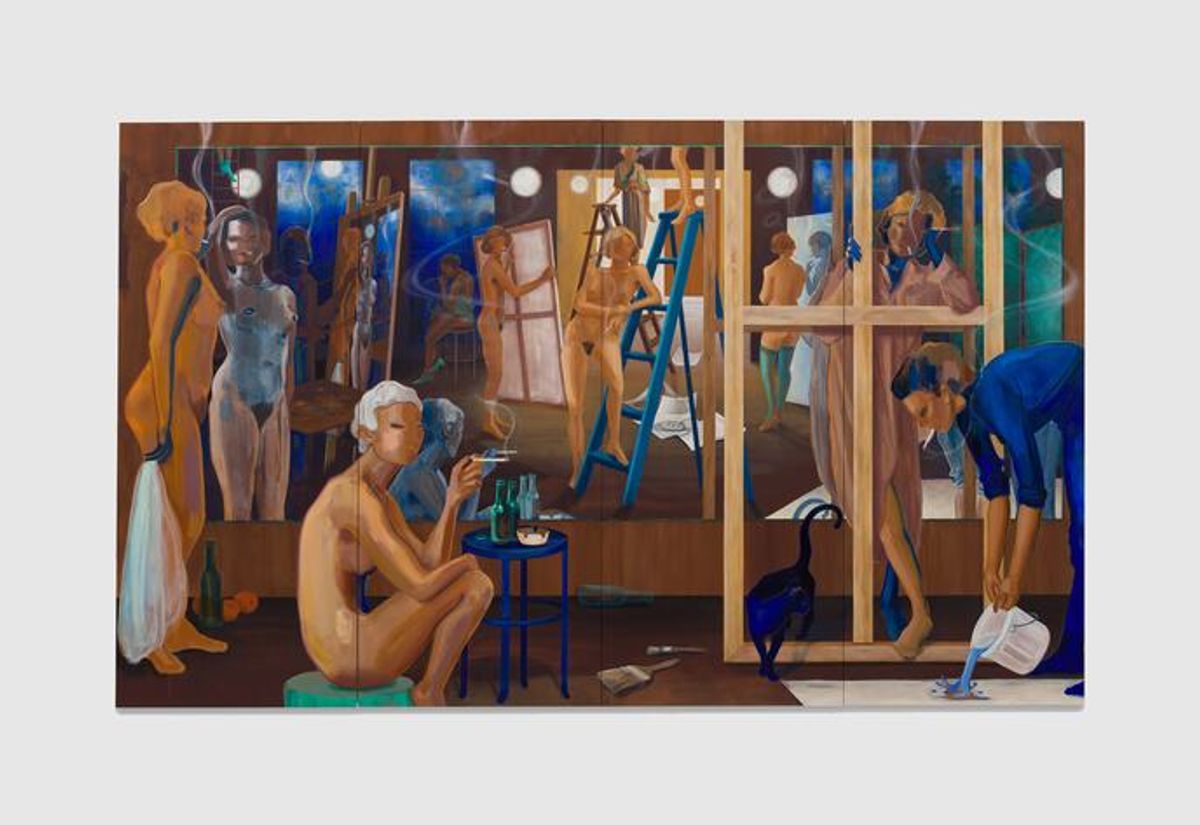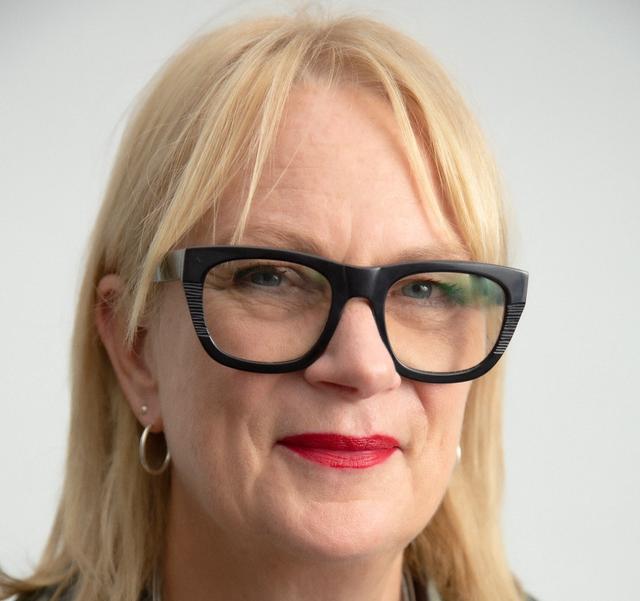The recently opened smorgasbord survey of painting at the Hayward Gallery in London offers yet more confirmation—if any more were needed—of the lifting of the spirits and the firing of the synapses triggered by a physical encounter with art, especially important after all the recent months of screen gazing.
Certainly the largely new work from the 31 intergenerational, multicultural British-based artists featured in the Hayward’s Mixing it Up: Painting Today confirm that the medium is still ripe for pushing, challenging and affirming. Here, for example, paint can be applied with meticulous miniaturist precision as in Daniel Sinsel’s suggestive, trompe l’oeil linen canvases; or in the hands of Samara Scott it can be substituted for cooking and cleaning fluids and trapped in Perspex to form impromptu stained glass windows, or it can even be swathed in rough slabs of cement and slathered onto pieces of carpet, courtesy of Alvaro Barrington.
The show has stunning works by already familiar names but also a great many new discoveries–for me at least. Lisa Brice ushers us in at the entrance with a four-panel magnum opus which amply lives up to its title of Smoke and Mirrors. Both of the above reflect, syncopate and further complicate an already spatially dizzying chamber containing a throng of her posing, painting, puffing and partially clad females, rescued from being art history’s objects of desire and given new agency as artists in their own right.
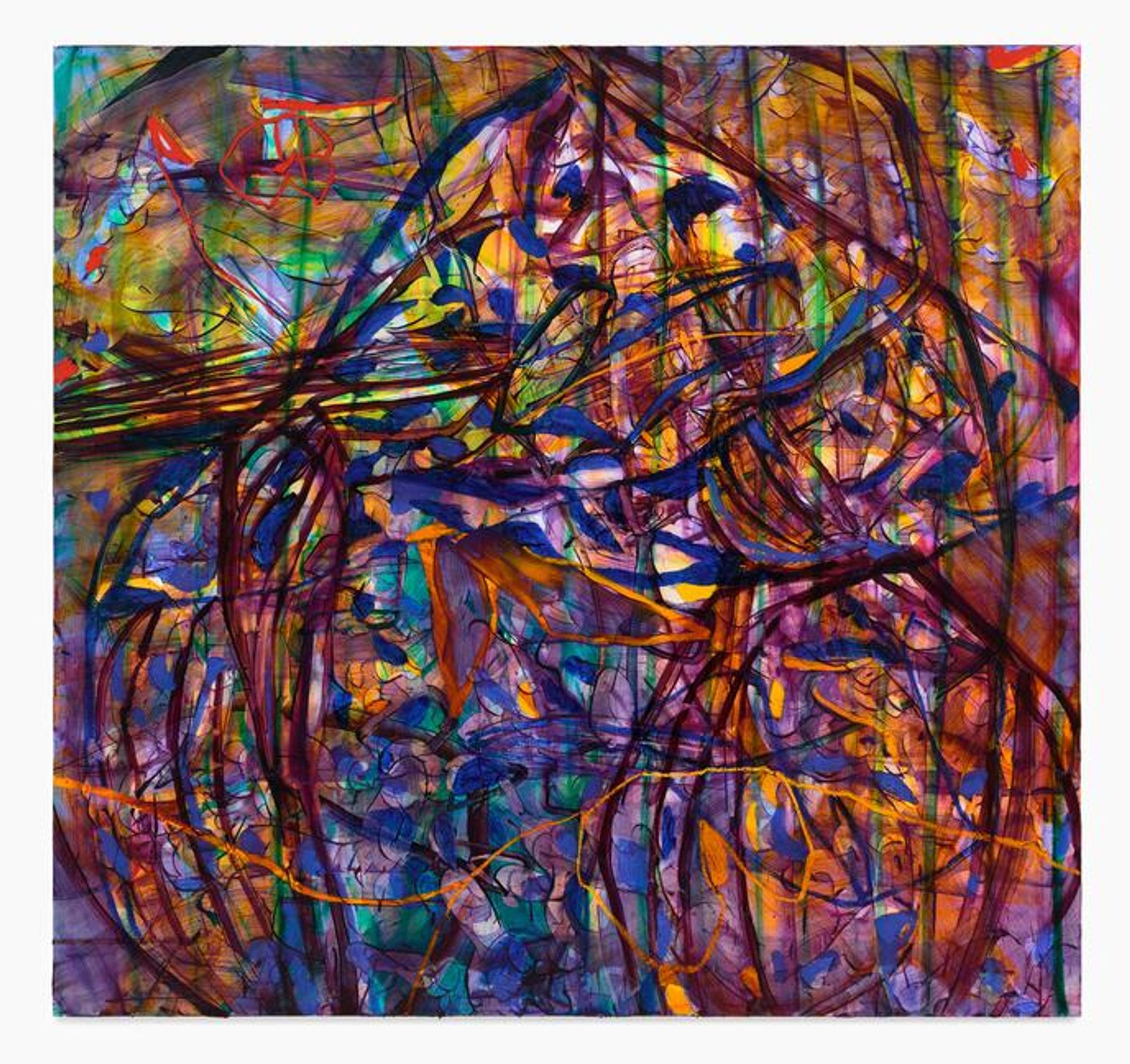
Jadé Fadojutimi's Cavernous Resonance (2020) Courtesy of the artist and Pippy Houldsworth
Another atmospheric interior is invoked in Denzil Forrester’s most recent nightclub scene where dancing bodies fragment into an electric explosion of graphic linear energy, while Rose Wylie presents a lushly rendered pair of women who teeter and topple, each boxed into stage-set surroundings that chime with Alvaro Barrington’s giant slabby cement containers across the room.
There are shadowy, sinister little paintings by Peter Doig; Caroline Coon’s elaborate arrangements of crisply pneumatic bodies and a series of defiantly posing voluptuous fantasy women painted by Somaya Critchlow. In a room of dynamic abstract works by Jadé Fadojutimi and Oscar Murillo there’s also a magnificent wall long abstract frieze of brilliant colour and bravura gesture by Rachel Jones that on closer examination turns into a giant row of teeth.
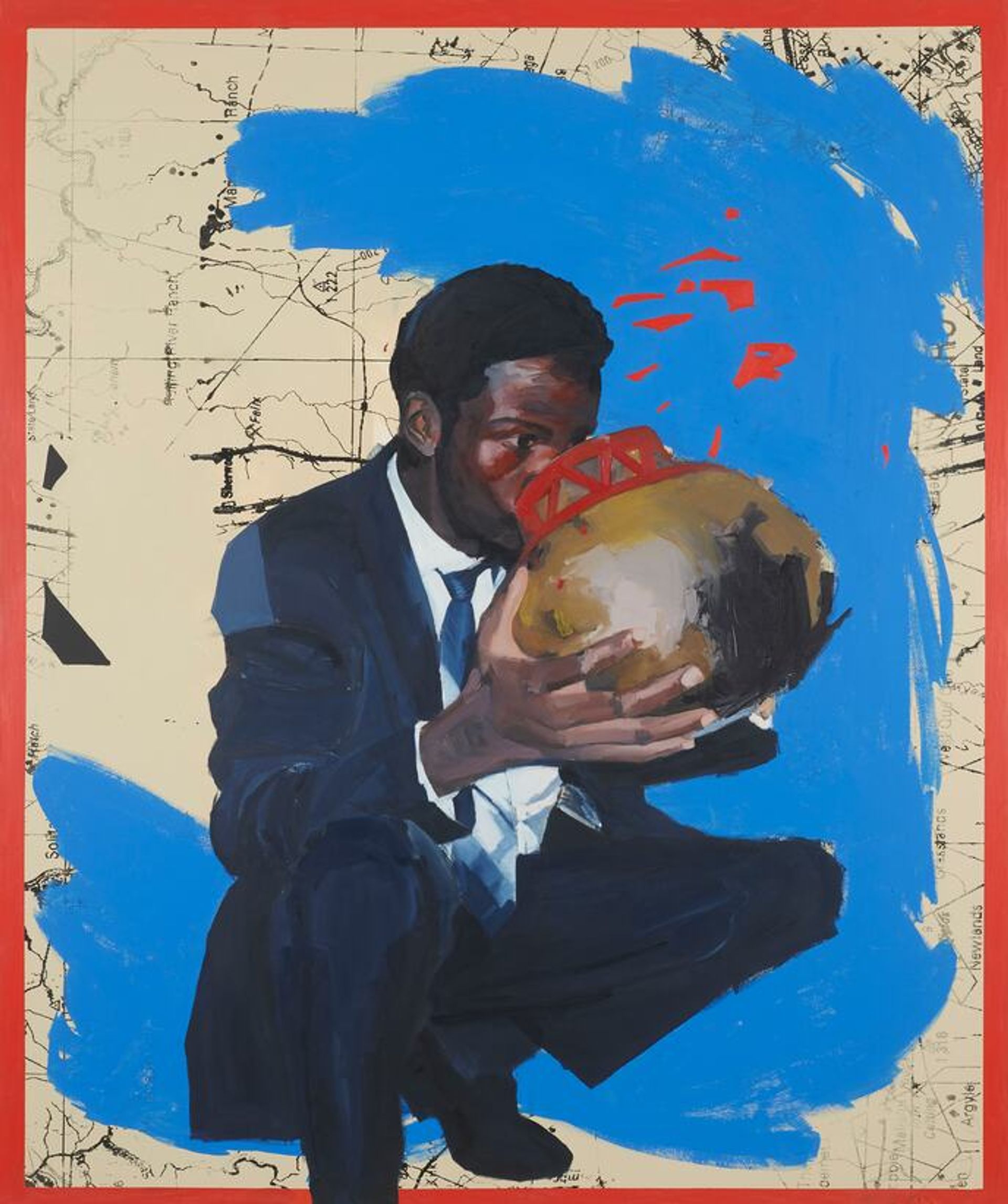
New to me and among the most memorable works in the show are the haunting paintings of Bagdad-born Mohammed Sami, in which the shadow of a plant or the outline of a black plastic chair blocking a door becomes almost unbearably malevolent. And the recent Ruskin School of Art graduate Kudzanai-Violet Hwami makes vividly collaged images that recall the gridded speed of social media, but here slowed down into the vivid sensuality of paint.
I was also stopped in my tracks by the radiant but disturbing gorgeousness of Louise Giovanelli’s oil paintings, whether the shrieking face of Hitchcock muse Tippi Hedren emerging out of pigmented impasto blobs or a giant diptych of gleaming gold shirts and a huge multi-panelled canvas of a vivid green curtain, all built up out of painstaking layers and incorporating gold leaf. By contrast, the figures and forms of Andrew Pierre Hart, another artist I didn’t know, emerge out of dense layers of deep, dark indigo.
Yet in the manner of all surveys, Mixing It Up leaves out as many artists as it includes, and is just a taster of the myriad artists making great paintings in the UK at this time. Gary Hume’s new paintings that I reviewed last week at Pop Goes the Pastoral in Framlingham show him continuing to probe his practice with a series of near-abstract large monochrome charcoal and pastel images of swans and pair of disconcerting portraits taken from Emile Zola’s 19th-century photographs of his now long-dead son.
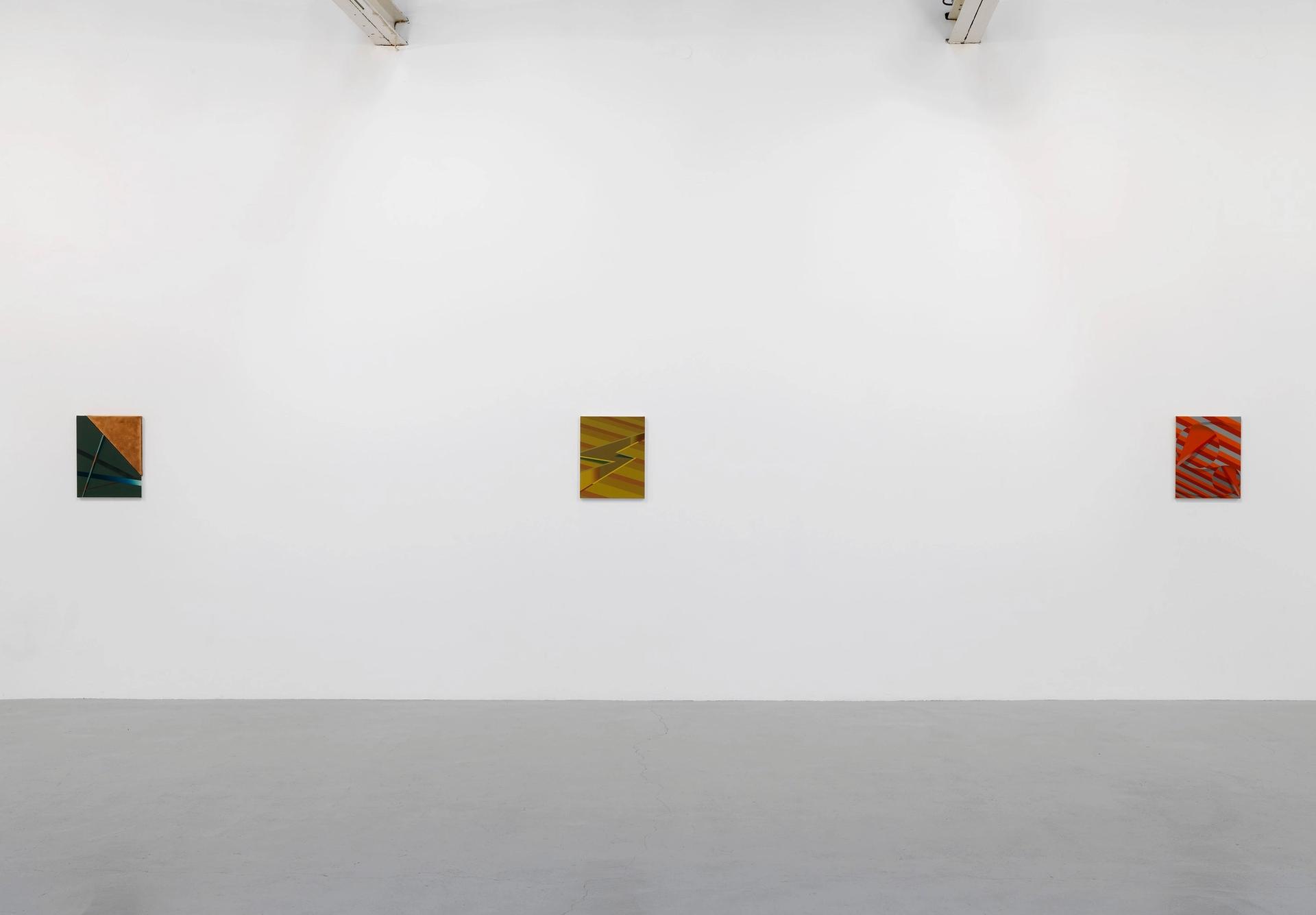
Installation view of Tomma Abts at Greengrassi London Courtesy of Greengrassi
Just south of the river from the Hayward at Greengrassi in Kennington, a new exhibition of paintings by the 2006 Turner Prize winner Tomma Abts confirms that her slow burning abstract paintings are just getting better and better. The more you look at these precise, oddly complex, small works the more they wrong-foot any easy readings and assumptions.
They seem at first to be the oeuvre of an undiscovered 20th-century Constructivist, but then there are surprising moments of emotionally charged expressiveness in the off-kilter shapes of her canvases and her surprisingly sensuous combinations of in-between colours. Spatial logic goes awry and there are more perplexing moments such as a section of canvas actually being not paint or fabric but a piece of meticulously cast aluminium.
The summer before last Tomma and I both spent a week staying in a house in Italy. Most afternoons she’d go inside for a couple of hours to paint and just as we were leaving (and only on my nosey insistence) she somewhat reluctantly showed what she’d been making. This turned out to be around a dozen watercolours which did not have the feel of being made during some holiday downtime. Each was a fully immaculately resolved formal and chromatic composition, often combining different painted and collaged-in elements.
Two of these works have found their way into the Greengrassi show; and while there is no hint of anything directly referential, in one the the slanting stripes of Verdigris green, taupe greys, russet browns and deep rich reds have a strong correspondence with the palette and arrangements of limbs in the great Resurrection by Piero Della Francesca in Sansepolcro that we had visited just a few days before. While all painters are aware of the weight of art history, every time they pick up a brush, it is the infinity of ways that they can still work with and against that history that keeps the medium perpetually alive and relevant.
• Mixing It Up: Painting Today, Hayward Gallery, 12 until December; Tomma Abts, Greengrassi, until 6 November; Pop Goes the Pastoral, The Old Theatre Framlingham, until October 7


